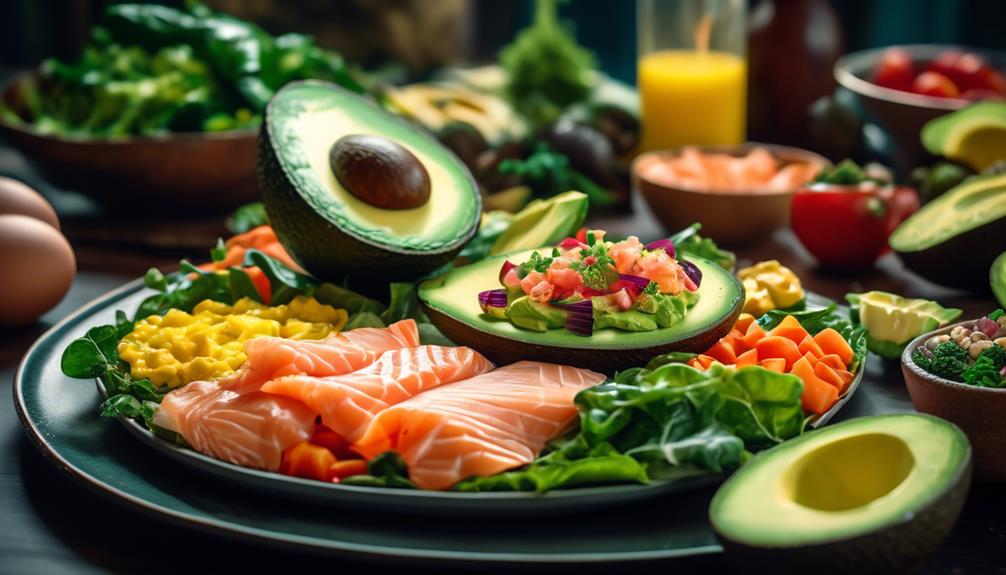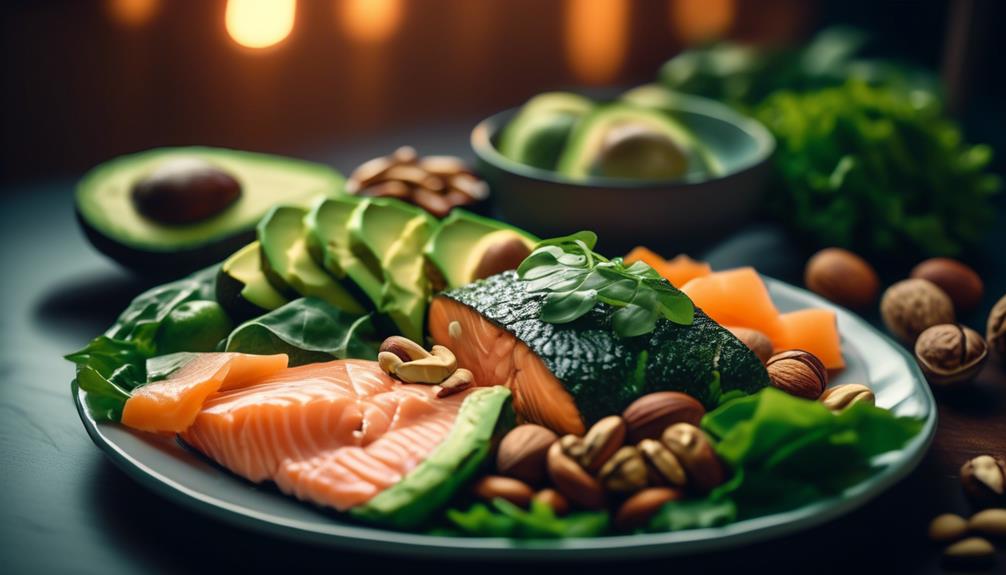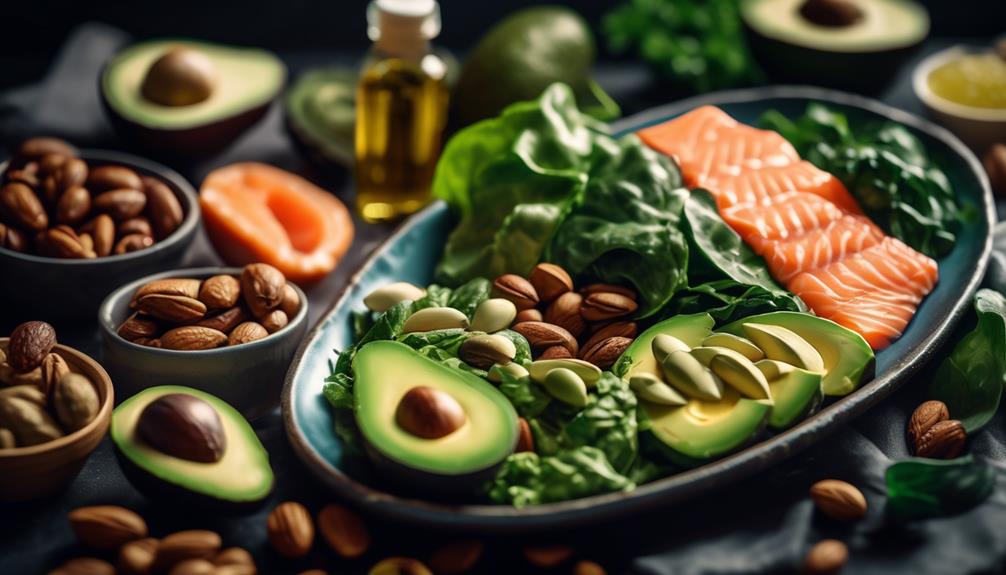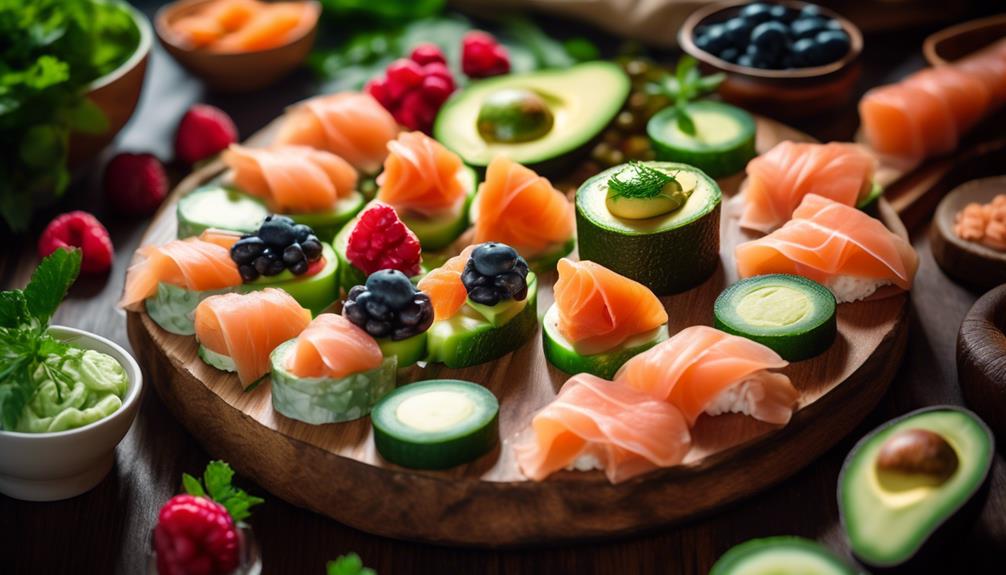Are you tired of dealing with chronic inflammation that leaves you feeling achy and uncomfortable? Well, there might be a solution for you – the keto diet. By reducing your carbohydrate intake and increasing healthy fats, this popular diet has been touted for its potential to alleviate inflammation in the body.
But how exactly does it work, and what steps can you take as a beginner to get started on this inflammation-reducing journey? In this guide, we will explore the ins and outs of the keto diet and its impact on inflammation, providing you with essential tips and information to help you on your way towards a healthier, inflammation-free lifestyle.
What Is the Keto Diet?

The keto diet is a low-carb, high-fat diet that has been shown to promote weight loss and improve various health markers. This diet works by putting your body into a metabolic state called ketosis. When you reduce your carbohydrate intake and increase your fat intake, your body starts to burn fat for fuel instead of glucose. This process leads to the production of ketones, which are molecules that are used by your body as an alternative source of energy.
Understanding ketosis is key to understanding the benefits of the keto diet. When your body is in ketosis, it becomes more efficient at burning fat and producing ketones. This can lead to weight loss and improved body composition. Additionally, ketones have been shown to have numerous health benefits. They can reduce inflammation, improve brain function, and provide a more stable and steady source of energy compared to glucose.
Understanding Inflammation
To understand inflammation, it's important to consider its causes and effects.
Inflammation can be triggered by various factors such as infections, injuries, and autoimmune disorders. When inflammation occurs, it can lead to redness, swelling, pain, and heat in the affected area.
Additionally, chronic inflammation has been linked to the development of various diseases, including heart disease, diabetes, and certain types of cancer.
Causes of Inflammation
Understanding the underlying causes of inflammation can be crucial in exploring ways to reduce its impact on your health. Inflammation can be classified as either acute or chronic.
Acute inflammation is the body's natural response to injury or infection, triggered by the immune system releasing chemicals to promote healing.
On the other hand, chronic inflammation is a prolonged and persistent response that can lead to various health issues. Diet plays a significant role in chronic inflammation.
Consuming a diet high in processed foods, refined sugars, and unhealthy fats can contribute to chronic inflammation. In contrast, a diet rich in anti-inflammatory foods like fruits, vegetables, healthy fats, and lean proteins can help reduce inflammation.
Effects of Inflammation
Inflammation, a natural response by your body's immune system, can have a significant impact on your overall health. Acute inflammation is a short-term response to injury or infection, with symptoms like redness, swelling, and pain. It's caused by the release of chemicals that attract immune cells to the affected area to fight off pathogens and promote healing.
On the other hand, chronic inflammation is a long-term condition that can lead to serious health problems. It's often caused by factors such as poor diet, lack of exercise, stress, and exposure to environmental toxins. Chronic inflammation has been linked to various diseases, including heart disease, diabetes, cancer, and autoimmune disorders.
Benefits of the Keto Diet for Inflammation

The keto diet offers several benefits for reducing inflammation in your body. By focusing on inflammation-fighting foods like fatty fish, leafy greens, and healthy fats, the keto diet provides essential nutrients that can help combat inflammation.
Additionally, this low-carb, high-fat diet has been shown to have a positive impact on the immune system, further supporting its potential in reducing inflammation.
Inflammation-Fighting Foods
To combat inflammation, incorporating inflammation-fighting foods into a ketogenic diet can be highly beneficial. Here are three inflammation-fighting foods that you can include in your keto diet:
- Fatty Fish: Fish such as salmon, sardines, and mackerel are rich in omega-3 fatty acids, which have been shown to reduce inflammation in the body. These fatty acids help to lower levels of inflammatory markers and can even alleviate symptoms of conditions like rheumatoid arthritis.
- Leafy Greens: Vegetables like spinach, kale, and Swiss chard are packed with antioxidants and anti-inflammatory compounds. These greens are also low in carbs, making them a perfect addition to a keto diet. They can help reduce inflammation and protect against chronic diseases.
- Turmeric: This golden spice contains a compound called curcumin, which has potent anti-inflammatory properties. Adding turmeric to your meals or consuming it as a supplement can help reduce inflammation in the body.
Impact on Immune System
Incorporating a keto diet can have significant benefits for inflammation, including its impact on the immune system.
The immune system plays a crucial role in defending the body against infections and diseases. When the immune system is functioning optimally, it can effectively identify and eliminate harmful pathogens.
However, an overactive immune response can lead to chronic inflammation, which is associated with various health conditions such as arthritis, diabetes, and cardiovascular disease.
Research suggests that the keto diet can help modulate the immune system and reduce inflammation. By restricting carbohydrates and increasing fat intake, the keto diet can promote a state of ketosis, where the body uses ketones for energy instead of glucose.
This metabolic shift can lead to a decrease in pro-inflammatory markers and an improvement in immune system function. Additionally, the keto diet has been shown to reduce oxidative stress and promote the production of anti-inflammatory compounds, further supporting its positive impact on the immune response.
Reduction in Chronic Pain
By following a keto diet, you can experience a reduction in chronic pain caused by inflammation. Inflammation plays a significant role in chronic pain conditions, such as arthritis and fibromyalgia.
Here are three ways the keto diet can help reduce inflammation and alleviate chronic pain:
- Ketogenic diet and reducing inflammation through exercise: Engaging in regular exercise while following a keto diet can help reduce inflammation in the body. Exercise promotes the release of endorphins, which act as natural painkillers and anti-inflammatory agents.
- Alternative therapies for chronic pain: Some individuals find relief from chronic pain by incorporating alternative therapies into their keto diet plan. These therapies may include acupuncture, massage, or chiropractic adjustments, which can help reduce inflammation and alleviate pain.
- Ketogenic diet and anti-inflammatory foods: The keto diet emphasizes consuming anti-inflammatory foods such as fatty fish, avocados, olive oil, and leafy greens. These foods are rich in omega-3 fatty acids and antioxidants, which can help reduce inflammation in the body and alleviate chronic pain.
Getting Started: Essential Foods for a Keto Diet

Start your keto diet journey by stocking up on essential foods that will support your body's transition into a state of ketosis. Incorporating meal prep strategies and following grocery shopping tips can help you stay on track and ensure you have the right foods on hand.
When meal prepping for a keto diet, focus on foods that are low in carbohydrates and high in healthy fats. This includes foods like avocados, coconut oil, olive oil, nuts, and seeds. These foods provide the necessary fats to fuel your body and keep you feeling satisfied.
When grocery shopping, prioritize fresh, whole foods. Fill your cart with leafy greens like spinach, kale, and lettuce, as well as cruciferous vegetables like broccoli and cauliflower. These vegetables are low in carbohydrates and packed with essential nutrients.
Protein is also important on a keto diet. Choose lean sources of protein such as chicken, turkey, fish, and tofu. Eggs are another excellent source of protein and healthy fats.
Don't forget to include dairy products in your keto diet. Opt for full-fat options like cheese, yogurt, and cottage cheese. These provide calcium and other essential nutrients while keeping your fat intake high.
Meal Planning Tips for a Beginner
When it comes to meal planning on a keto diet, there are a few key points to keep in mind.
First, ensure you're getting all the essential nutrients your body needs by including a variety of foods such as lean proteins, healthy fats, and low-carb vegetables.
Secondly, practice portion control to maintain the appropriate balance of macronutrients.
Lastly, consider incorporating anti-inflammatory foods into your meals to further support reducing inflammation in the body.
Essential Nutrients for Meal Planning
Planning your meals as a beginner can be made easier by ensuring you include essential nutrients necessary for a balanced diet. Here are three essential nutrients to consider when meal planning:
- Protein: Include lean sources of protein such as chicken, turkey, fish, or tofu. Protein is crucial for building and repairing tissues and helps to keep you feeling fuller for longer.
- Healthy fats: Incorporate sources of healthy fats like avocado, olive oil, nuts, and seeds. These fats provide energy, support brain health, and help absorb fat-soluble vitamins.
- Fiber: Choose high-fiber foods like vegetables, fruits, and whole grains. Fiber aids in digestion, promotes satiety, and helps regulate blood sugar levels.
Portion Control Strategies
To ensure successful meal planning as a beginner, it's important to implement effective portion control strategies that can help you maintain a balanced and nutritious diet. Portion control is crucial for weight management and overall health. Here are some meal planning tips to help you with portion control.
First, use smaller plates and bowls to visually trick your brain into thinking you're eating more. This can prevent overeating. Additionally, measure your food using measuring cups or a food scale to accurately portion your meals. This will help you avoid consuming more calories than necessary.
Another effective strategy is to fill half of your plate with non-starchy vegetables, a quarter with lean protein, and a quarter with healthy carbohydrates. This method ensures a well-balanced meal.
Lastly, listen to your body's hunger and fullness cues. Eat slowly and mindfully, savoring each bite. This will help you recognize when you're satisfied and prevent overeating.
Incorporating Anti-Inflammatory Foods
Incorporate anti-inflammatory foods into your meal planning as a beginner to support overall health and reduce inflammation. Here are three key ways to include these foods in your diet:
- Load up on fruits and vegetables: These are rich in antioxidants and phytochemicals that can help reduce inflammation. Aim for a variety of colorful options like berries, leafy greens, and cruciferous vegetables.
- Include healthy fats: Foods like avocados, olive oil, and fatty fish are high in omega-3 fatty acids, which have anti-inflammatory properties. Try adding them to your salads, stir-fries, or as a topping for your meals.
- Prioritize gut health: A healthy gut plays a crucial role in reducing inflammation. Include probiotic-rich foods like yogurt, sauerkraut, and kimchi to promote a healthy balance of gut bacteria.
Tracking Macros: How to Stay on Track With the Keto Diet
Staying on track with the keto diet can be made easier by actively monitoring your macronutrient intake. Tracking your macros allows you to ensure that you're consuming the correct ratio of fats, proteins, and carbohydrates to maintain a state of ketosis.
Meal tracking is an effective method to keep yourself accountable and ensure you're staying within your desired macronutrient range. There are numerous apps and websites available that make meal tracking simple and convenient. These tools allow you to input your meals and snacks, calculate the macronutrient content, and track your progress over time. By consistently tracking your meals, you can identify any imbalances or areas where adjustments need to be made.
Additionally, incorporating keto-friendly recipes into your meal planning can help you stay on track with your macronutrient goals. There are countless delicious recipes available that are low in carbohydrates and high in healthy fats. Experimenting with different recipes can help you avoid monotony and make the diet more enjoyable.
Keto-Friendly Snack Ideas for Inflammation Reduction

By choosing keto-friendly snack options, you can further support inflammation reduction while staying on track with your macronutrient goals. The ketogenic diet has been shown to have numerous benefits for reducing inflammation in the body. Here are three keto-friendly snack ideas that can help you in your journey towards inflammation reduction:
- Avocado Deviled Eggs: Hard-boiled eggs are a great source of protein and healthy fats. By mashing the yolks with avocado instead of mayonnaise, you can create a creamy and delicious snack that's rich in anti-inflammatory monounsaturated fats.
- Turmeric Roasted Almonds: Almonds are packed with healthy fats and antioxidants, making them a perfect keto snack. By roasting them with turmeric, a spice known for its anti-inflammatory properties, you can enhance their nutritional benefits while adding a flavorful twist.
- Zucchini Chips: Zucchini is a low-carb vegetable that can be transformed into crispy and satisfying chips. Simply slice the zucchini into thin rounds, toss them in olive oil, and bake until crispy. These chips make a great alternative to traditional potato chips and provide a dose of anti-inflammatory nutrients.
Incorporating these keto-friendly snack recipes into your diet can't only help you stay on track with your macronutrient goals but also aid in reducing inflammation in your body.
Incorporating Anti-Inflammatory Herbs and Spices
To enhance the anti-inflammatory benefits of your keto diet, consider incorporating a variety of herbs and spices known for their potent anti-inflammatory properties. These natural ingredients can't only add flavor to your meals but also help reduce inflammation in your body.
Some of the most effective anti-inflammatory herbs and spices include turmeric, ginger, cinnamon, garlic, and cayenne pepper.
Turmeric, a vibrant yellow spice, contains a compound called curcumin, which has been shown to possess strong anti-inflammatory properties. Adding turmeric to your dishes can help reduce inflammation and alleviate symptoms of conditions such as arthritis and inflammatory bowel disease.
Ginger is another powerful anti-inflammatory herb that can be easily incorporated into your diet. It contains gingerol, a bioactive compound with anti-inflammatory effects. Ginger can be used fresh, dried, or in powder form to add a zing to your meals while providing anti-inflammatory benefits.
Cinnamon, a popular spice, not only adds warmth and sweetness to your dishes but also possesses anti-inflammatory properties. It can help reduce inflammation and lower the risk of chronic diseases such as heart disease and diabetes.
Garlic, known for its distinct flavor, contains sulfur compounds that have been shown to have anti-inflammatory effects. Incorporating garlic into your meals can help reduce inflammation and boost your immune system.
Lastly, cayenne pepper, with its spicy kick, contains capsaicin, which has been found to possess anti-inflammatory properties. Adding cayenne pepper to your dishes can help reduce inflammation and alleviate pain.
Incorporating these anti-inflammatory herbs and spices into your keto diet can enhance the anti-inflammatory benefits of the diet itself. They can help reduce inflammation in your body, alleviate symptoms of chronic conditions, and protect against the development of certain diseases. Consider using these herbal remedies and spices to add flavor and promote your overall health.
Hydration and Electrolyte Balance on a Keto Diet

Maintaining proper hydration and electrolyte balance is crucial when following a keto diet. The ketogenic diet can cause an increased excretion of water and electrolytes, which can lead to dehydration and imbalances in essential minerals. Here are three key points to consider for optimal hydration and electrolyte balance on a keto diet:
- Adequate Water Intake: Drinking enough water is essential to prevent dehydration. Aim for at least 8 cups (64 ounces) of water per day, or more if you're physically active or live in a hot climate. Remember to listen to your body's thirst cues and drink water throughout the day.
- Electrolyte Supplementation: Since the keto diet restricts certain food groups that are rich in electrolytes, such as fruits and starchy vegetables, it may be necessary to supplement with electrolytes. Sodium, potassium, and magnesium are the most important electrolytes to focus on. Consider adding table salt to your meals, consuming potassium-rich foods like avocados and leafy greens, and taking a magnesium supplement if needed.
- Benefits of Adequate Hydration: Proper hydration supports numerous bodily functions, including digestion, nutrient absorption, waste removal, and temperature regulation. It can also help prevent muscle cramps, dizziness, fatigue, and other symptoms associated with dehydration. Staying well-hydrated on a keto diet can optimize your overall health and well-being.
Exercise and Inflammation: How Keto Can Help
Proper hydration and electrolyte balance aren't only important for maintaining a keto diet, but they also play a crucial role in reducing inflammation during exercise. When following a keto diet, your body relies on fat as its primary source of fuel, rather than carbohydrates. This metabolic shift has been shown to have numerous benefits for exercise performance and inflammation management.
One of the main advantages of exercising on a keto diet is its ability to enhance fat utilization. As your body becomes adapted to using fat for fuel, it becomes more efficient at burning stored body fat during exercise. This can lead to improved endurance and overall performance.
Moreover, the keto diet has been found to have anti-inflammatory effects. By reducing the intake of processed foods, sugars, and grains, which are known to promote inflammation, the keto diet helps to lower systemic inflammation levels. This is particularly beneficial for managing exercise-induced inflammation, which occurs as a result of the stress placed on the body during physical activity.
In addition, the keto diet may also aid in the production of ketones, which have been shown to have anti-inflammatory properties. Ketones are produced when your body is in a state of ketosis, and they can help to reduce inflammation by suppressing the activation of inflammatory pathways.
Managing Keto Flu Symptoms

Managing the symptoms of Keto Flu can be essential for a successful transition to a ketogenic diet. As you embark on your journey, it's important to be prepared and take steps to mitigate the discomfort that can come with the transition. Here are three strategies to help you manage Keto Flu symptoms:
- Meal Prep: Planning your meals in advance can make a world of difference. By having keto-friendly meals readily available, you can avoid the temptation of reaching for carb-heavy foods when you're feeling unwell. Meal prepping can also ensure that you're getting all the necessary nutrients while staying within your macronutrient goals.
- Supplements: Certain supplements can help alleviate the symptoms of Keto Flu. Electrolytes, such as sodium, potassium, and magnesium, are often depleted during the initial stages of ketosis. Taking electrolyte supplements or incorporating foods rich in these minerals can help maintain proper electrolyte balance and reduce symptoms like fatigue and muscle cramps.
- Hydration: Staying hydrated is crucial when following a ketogenic diet, especially during the transition period. Drinking enough water throughout the day can help flush out toxins and alleviate symptoms like headaches and dizziness.
Long-Term Maintenance: Staying Inflammation-Free With Keto
To ensure a successful and inflammation-free keto journey in the long term, it's important to prioritize strategies that support your overall health and well-being.
Long-term sustainability on the keto diet requires a commitment to lifestyle changes and a focus on preventing relapse.
One key strategy for maintaining a keto lifestyle is to establish a routine and stick to it. Consistency is crucial in order to keep your body in a state of ketosis and effectively reduce inflammation. Planning and preparing meals in advance can help you stay on track and avoid making impulsive food choices that may trigger inflammation.
Another important aspect of long-term maintenance is staying active. Regular exercise not only supports weight management, but it also helps reduce inflammation. Incorporating both cardiovascular exercises and strength training into your routine can have a positive impact on your overall health and well-being.
Additionally, it's essential to monitor your progress and make adjustments as needed. Regularly tracking your food intake, ketone levels, and other health markers can help you identify any potential triggers for inflammation and make necessary modifications to your diet and lifestyle.
Conclusion
Inflammation can be a real pain, but the keto diet can be your secret weapon in the fight against it. By reducing carbohydrates and increasing healthy fats, you can fuel your body to reduce inflammation and promote overall well-being.
With proper meal planning, hydration, and exercise, the keto diet can help you stay inflammation-free in the long run.
So why not give it a try and experience the transformative power of keto for yourself?







